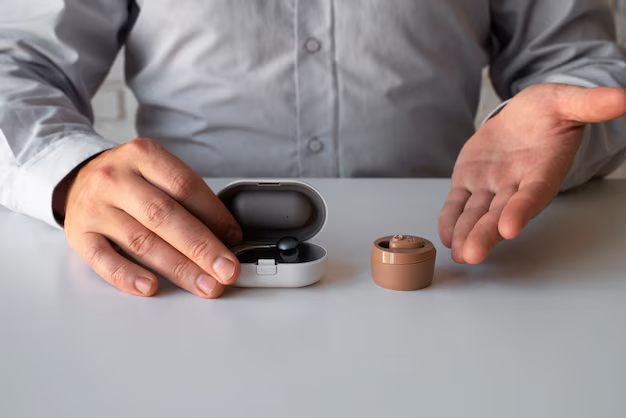Discover How Hearing Aids Can Alleviate Tinnitus: What You Need to Know
Have you ever experienced a persistent ringing, buzzing, or hissing sound in your ears that just won't go away? You’re not alone. Tinnitus is a sensation of noise that is present in one or both ears without an external sound source. As frustrating as it can be, understanding whether hearing aids can help with tinnitus brings hope to many. This article unfolds the relationship between hearing aids and tinnitus relief, providing you with essential insights and actionable guidance.
Understanding Tinnitus: Causes and Symptoms
Before diving into how hearing aids can be useful, it's crucial to grasp what tinnitus entails. Tinnitus isn't a condition in itself but a symptom of underlying conditions like hearing loss, ear injury, or circulatory problems. Stress and exposure to loud sounds can also exacerbate tinnitus symptoms.
Common Symptoms of Tinnitus
- Ringing or Buzzing: The most typical sound associated with tinnitus.
- Hissing or Roaring: Some describe it as resembling seashell roar.
- Clicking: A rare type of tinnitus mimicking clicking sounds.
- Low-frequency Noises: Sometimes, the sound can be a dull droning.
How Hearing Aids Can Provide Relief
Hearing aids are primarily designed to amplify environmental sounds, assisting those with hearing loss. Fortunately, they can offer additional benefits for those dealing with tinnitus.
Amplification of External Sounds
Hearing aids can make external sounds more prominent, often masking the internal sounds of tinnitus. By allowing the brain to focus on real-world noises, the perceived intensity of tinnitus can be reduced. This shift in auditory attention can provide significant relief for many individuals.
Enhancement of Hearing Clarity
By improving overall hearing, hearing aids can decrease the strain and stress of trying to hear and interpret sounds. This helps reduce the emotional and psychological impact of tinnitus, making sufferers feel less isolated or distractible.
Innovative Features Designed for Tinnitus
Modern advancements in hearing aid technology have introduced specific features aimed directly at tinnitus management.
Noise Masking
Many contemporary hearing aids come with specialized noise-masking features that generate soothing sounds or white noise. These sounds can block or mask tinnitus, offering a calming effect that eases perception.
Tinnitus Support Programs
Some hearing aids are equipped with comprehensive tinnitus support programs, which can be customized to match an individual's specific tinnitus profile, offering a more personalized relief experience.
Considering Hearing Aids: Who Might Benefit?
While not every tinnitus sufferer will find relief through hearing aids, they prove beneficial for individuals whose tinnitus is coupled with hearing loss.
Individuals With Hearing Loss
People with noise-induced hearing loss or age-related hearing loss often report improvement in tinnitus symptoms with the use of hearing aids. The amplification feature can drown out internal noises, making these aids invaluable.
Those Seeking Non-Invasive Options
Since hearing aids don't involve medication or surgical procedures, they are a non-invasive solution worth considering by those seeking alternative, safer interventions.
Understanding Your Options and Next Steps
Choosing the right hearing aid is pivotal to managing tinnitus effectively. This section outlines considerations and steps to take for those exploring hearing aids as a treatment option.
Consultation and Hearing Assessment
To determine suitability, consult with a hearing specialist to assess the degree of hearing loss and document tinnitus characteristics. Understanding the nature of your condition is the first step to selecting the most effective hearing aid.
Types of Hearing Aids
Briefly, hearing aids come in various styles:
- Behind-the-Ear (BTE): Offers robust support, ideal for severe hearing loss.
- In-the-Ear (ITE): Less conspicuous, but slightly less powerful.
- In-the-Canal (ITC) & Completely-in-Canal (CIC): Most discreet options.
Trial Periods and Adjustments
Ensure that your chosen hearing aid comes with a trial period. It’s essential to adjust and fine-tune settings, like volume and noise-masking levels, to achieve the best results in managing tinnitus.
Additional Management Tips for Tinnitus
Beyond hearing aids, lifestyle changes and coping strategies can also aid in managing tinnitus symptoms effectively.
Stress Reduction Techniques
Techniques such as mindfulness, meditation, and yoga can help quiet the mind, reducing the emotional grip of tinnitus.
Sound Therapy
Incorporating soothing sounds at home, such as nature recordings or soft music, can provide relief and relaxation, complementing the benefits of hearing aids.
Healthy Lifestyle Choices
Maintaining a healthy diet, regular exercise, and adequate sleep can contribute positively to overall ear health and help manage symptoms.
Dispelling Common Myths About Tinnitus
The conversation around tinnitus can sometimes be clouded by misconceptions. Here’s a look at myths that need debunking:
Myth 1: Only loud noise exposure causes tinnitus.
Fact: Tinnitus can arise from diverse causes, including hearing loss, infections, and even certain medications.Myth 2: Tinnitus is always a sign of impending deafness.
Fact: While it commonly accompanies hearing loss, tinnitus does not always forecast complete deafness.Myth 3: Nothing can be done about tinnitus.
Fact: While it may not be curable, several effective management techniques, including hearing aids, are available.
Confronting tinnitus can feel isolating, but understanding potential solutions provides a path forward. Hearing aids, particularly those designed with tinnitus management features, can help lessen the impact of tinnitus, especially for those with concurrent hearing loss. Like any health decision, exploring these options with professional guidance and considering complementary strategies empowers you to take control of your auditory health.
Quick Summary of Key Points
- 👂 Hearing Aids: Effective in masking tinnitus sounds by amplifying external noises.
- 🔊 Noise Masking: Many modern aids come with built-in sound therapy features.
- 🩺 Professional Assessment: Consultation with a hearing specialist is vital.
- 🔄 Trial Periods: Seek devices offering trial to ensure best fit and settings.
- 🧘 Stress Management: Employ stress reduction and healthy lifestyle choices for additional relief.

